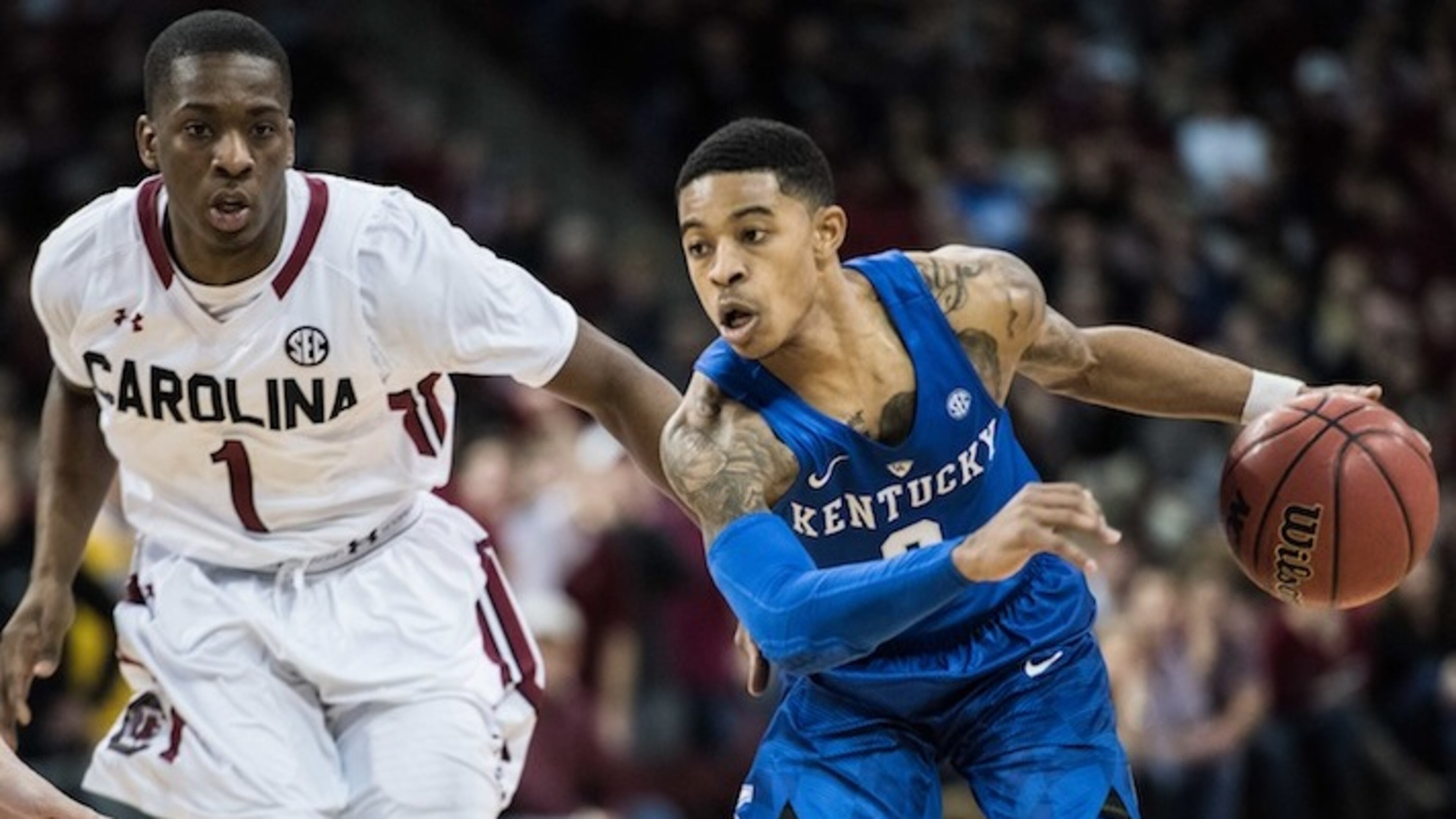Analytics say Kentucky's Ulis is an NBA-caliber point guard

Typically, the name "Kentucky" across a jersey comes equipped with a reservation as an NBA draft lottery pick.
As the best player on a John Calipari-led Wildcats team, history suggests being among the first handful of names called is custom, but that probably won't be the case for sophomore point guard Tyler Ulis.
No, Ulis most likely will not hear his name called in the opening minutes of the draft; he probably won't be selected in the lottery, and he might still be available after the first round concludes.
Meanwhile, numerous floor generals are being projected as earlier NBA selections than Ulis, including Providence's Kris Dunn, Notre Dame's Demetrius Jackson, Maryland's Melo Trimble, and even Kentucky's Isaiah Briscoe.
But in an analytically driven league that places advanced stats on a pedestal, some of the most telling categories indicate Ulis is among the elite against college competition.
In analyzing Ulis' efforts alongside the other nine Bob Cousy Award finalists -- presented to the nation's top point guard -- Ulis' name appears among the upper echelon of nearly every meaningful advanced stat.
A point guard's primary duties are to serve as the coach on the court, orchestrate the offense, and ultimately, produce points. To that end, Ulis headlines the Cousy finalists in offensive rating per 100 (an estimate of points produced per 100 possessions) with a 131.5 rating -- a staggering 25.5 points more than Dunn, a projected top-five pick.
Only five NBA teams currently average 100-plus possessions per game, with the Phoenix Suns just over that mark with a 100.1 pace rating -- number of possessions for 48 minutes; your average NBA game. Essentially, the discrepancy in offensive rating between Ulis and Dunn would mean if they were to each orchestrate the Suns' offense all game, Phoenix would score 25.5 more points with Ulis at the helm.
Relatedly, producing points at such an impressive clip translates to wins, at least in regard to the individualized win shares per 40 statistic -- an estimate of the number of wins a player contributes per 40 minutes. The league average is approximately .100. Ulis' .230 rating among the Cousy finalists ranks second, behind only Oakland's Kay Felder (.240). Meanwhile, Dunn (.182), Jackson (.178) and Trimble (.195) -- all of whom are projected as NBA draftees ahead of Ulis -- are well behind the value Ulis brings to Kentucky's success.
Even more telling of Ulis' value as an efficient and productive floor general is the collective consideration of his assists percentage, turnover percentage, and usage percentage.
Out of the 10 point guards in the discussion, Ulis' assists percentage -- the percentage of teammates' field goals a player assisted on while on the court -- ranks No. 5 at 32.3 percent, just behind Oregon State's Gary Payton II and just ahead of Trimble. And he's managed to dish the ball at a high clip, despite having the second-lowest usage percentage (an estimate of the percentage of a team's plays used by a player when on the floor) among the Cousy finalists at 21.6 percent.
Essentially, Ulis is doing more with much less, and doing so in a tremendously efficient manner -- his turnover percentage (estimated number of turnovers per 100 possessions) of 11.6 ranks behind only Iowa State's Monte Morris' unfathomable 9.4 percent. Again, prospectively putting this in an NBA-bound context, if Ulis were to be given the keys to the Suns' offense for an entire game, he would commit 6.3 fewer turnovers per 100 possessions than Dunn and 6.2 fewer than Trimble. Ulis' assists-to-turnover ratio of 3.56 ranks No. 9 in the entire NCAA.
Ulis does not dominate every advanced statistical category in relation to his peers. His player efficiency rating (PER) -- a collective average of the most meaningful stats -- places him fourth among the Cousy finalists at 24.0. He trails only Felder (29.1), Payton Jr. (26.8) and Dunn (24.5).
Still, with the statistical evidence clearly throwing Ulis into the discussion of college basketball's premier floor generals, is his 5-foot-9 stature so much of a drawback that his NBA draft stock should suffer so greatly?
ESPN Insider's Chad Ford cites size as Ulis' downfall, saying in the Kentucky star's draft profile on ESPN.com: "If Ulis were 5 inches taller, he'd be a top-five pick. That's how much scouts are in love with his game."
Sam Vecenie of CBS Sports expanded on that sentiment in a recent conversation:
"The concerns with Ulis are legitimate," Vecenie said. "He's small. He's skinny. He doesn't have great length even beyond the height. Despite the high-pressure defense, he can occasionally get bullied around on that end by bigger guys. There isn't much in the way of versatility on that end because of that."
But while Ulis' name falls far down some NBA big boards and mock drafts, including a No. 51 position from DraftExpress.com and No. 42 ranking from ESPN, Vecenie is one of the few who have bought stock in the Kentucky point guard's game, evidenced by a No. 26 ranking on his latest CBS Sports big board.
"I just buy him as a kid," Vecenie said. "He's literally a second coach on the floor, and he's a leader. Basically, the kid can just play, and he's a guy NBA players are going to love playing with due to his toughness."
It's hard to disagree after watching Ulis, who's been the backbone of a Kentucky team finally finding the strength to stand on its own. Now, with Ulis coming off a career-best effort with 27 points, 12 assists, and only one turnover in Kentucky's 89-62 win over South Carolina on Saturday, it might be time to look more closely at the numbers.


